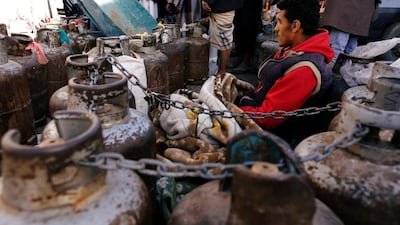On Sunday, protesters took to the streets of Sanaa, the capital of Yemen, which has been under the control of Houthi militias since 2014. The oppressive atmosphere that has shrouded the city for four years combined with the severe penalties meted out by the Houthis to anyone bold enough to defy their absolutist rule have deterred civil demonstrations. But the stratospheric spike in gas prices in Houthi held provinces in recent weeks finally lit the fuse on the public anger that has been accumulating quietly for years. As The National reports from the ground, the price of a canister of gas, which used to cost 1,200 rials, has peaked to 10,000 rials in recent days.
It hasn't escaped the residents of Sanaa that the current scarcity is the result of another deliberate manipulation of the market by the Houthis, who have a very tawdry history of profiting from artificially imposed shortages of gas. Last year, for instance, the cost of a cylinder of gas in Houthi-controlled districts of Tihama and Azal abruptly rose to 8,000 rials. In areas of Yemen run by the country's legitimate government, a canister of gas cost 950 rials. The vast differences in prices of gas in the same country convey the central truth of the conflict in Yemen: ordinary people are split between an internationally recognised government that aims to serve and protect Yemenis and a band of Iran-backed militias who torment Yemenis and exploit Yemen for their own self-enrichment. The men and women protesting in Sanaa are no doubt aware of the contrast between the direness of their condition under the Houthis and the stability enjoyed by their compatriots in government-held regions. Just 173 kilometres to the north of Sanaa, in the government-run province of Marib, the state oil company Safer produces nearly 2,000 tonnes of natural gas, diesel and crude oil every day.
It is the Houthis and their backers who prevent the rest of Yemen from emulating Marib. Not only have the Houthis plunged Yemenis into abject misery; they have turned Yemen itself into an instrument in the Iranian regime's war against the Arab world. It is from the Houthi-run parts of Yemen that missiles manufactured in Iran have repeatedly been fired in the direction of Saudi Arabia and its allies. On Monday, French foreign minister Jean-Yves Le Drian travelled to Tehran to hold talks with his Iranian counterparts. The matter of Iran's ballistic missile programme is on the agenda. The international community must realise that it cannot moderate the Iranian regime's destructive conduct by rewarding it. It can only do so by holding it to account. The protesters in Sanaa are a reminder that Tehran stands as an obstacle to peace in Yemen.

